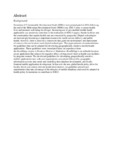Please use this identifier to cite or link to this item:
https://cris.library.msu.ac.zw//handle/11408/4105| Title: | Guidelines for developing geographically sensitive mobile health applications | Authors: | Nyapwere, Newton Dube, Yolisa P Makanga, Prestige T |
Keywords: | GIS mHealth SDGs guidelines global health |
Issue Date: | 14-Feb-2021 | Publisher: | Health and Technology | Series/Report no.: | Volume 11, pages 379–387 (2021); | Abstract: | Seventeen (17) Sustainable Development Goals (SDGs) were promulgated in 2016 following the end of the Millennium Development Goals (MDGs) era. SDG 3 aims to ensure health lives and promote well-being for all ages. Increasing use of geo-enabled mobile health applications can positively contribute to the realisation of SDG 3 targets. Health facilities and the communities that require health care are connected by geography. Digital technologies are increasingly becoming an important resource for health service delivery and public health. However, there is need for a framework that guide the development and deployment of context relevant location based digital technologies. This paper presents recommendations for guidelines that can be adopted for developing geographically sensitive mobile health applications. These guidelines were formulated based on experience from the RoadMApp project in Kwekwe District of Zimbabwe. RoadMApp is an mHealth location aware application that reduces the negative effects of long travel times to health care facilities by pregnant women. The developed guidelines for developing geographically sensitive mobile applications start with user requirements assessment followed by geographic information systems data needs and modelling then database development, and finally frontend mobile application development. In line with the new global health policy drive for locally driven and context relevant health interventions, the guidelines present new opportunities that take advantage of the ubiquity of mobile telephony and could be adopted in health policy formulations to contribute to SDG3. | URI: | https://link.springer.com/article/10.1007/s12553-020-00518-2 http://hdl.handle.net/11408/4105 |
ISSN: | 21907188 |
| Appears in Collections: | Research Papers |
Files in This Item:
| File | Description | Size | Format | |
|---|---|---|---|---|
| nyapwere.pdf | Abstract | 132.67 kB | Adobe PDF |  View/Open |
Page view(s)
184
checked on Feb 13, 2026
Download(s)
50
checked on Feb 13, 2026
Google ScholarTM
Check
Items in MSUIR are protected by copyright, with all rights reserved, unless otherwise indicated.



